Tag : Emma Gray
May 2, 2011 by Emma Gray
Glee’s Rachel Berry Confronts Her “Jewish Nose”
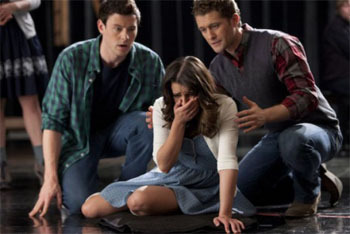 Last week, Glee aired a much-anticipated 90-minute episode, entitled “Born This Way,” after Lady Gaga’s inclusive anthem. During the episode, each character deals with the things about themselves that they are most ashamed of, ultimately embracing these characteristics. For Rachel Berry (played by Lea Michele), one of the most markedly Jewish characters on the show, her challenge is accepting her not-so-button nose.
Last week, Glee aired a much-anticipated 90-minute episode, entitled “Born This Way,” after Lady Gaga’s inclusive anthem. During the episode, each character deals with the things about themselves that they are most ashamed of, ultimately embracing these characteristics. For Rachel Berry (played by Lea Michele), one of the most markedly Jewish characters on the show, her challenge is accepting her not-so-button nose.
The myth of the Jewish nose is one of the most widely espoused Jewish stereotypes. Its origins can be traced to the flawed “science” of 19th century Eugenics movements. Eugenics attempted to define ethnicity through physical characteristics. In his book Making the Body Beautiful, Sander L. Gilman explains that these traits were generally compared to and vilified in relation to a white, European “ideal.”
The German children’s storybook, Der Giftpilz, published in 1938, provides a perfect example of the explicit discussion of the Jewish nose. In one of the stories, Little Karl, a 7th grade schoolboy, describes to his classmates how to recognize a Jew. “One can most easily tell a Jew by his nose. The Jewish nose is bent at its point. It looks like the number six. We call it the Jewish six.”
Although we have come a long way since 20th century ideas of racial purity, the myth of the giant Jew nose still runs rampant, providing perfect fodder for Glee’s writer, Brad Falchuk. Falchuk himself happens to be Jewish, as well as the son of the current president of national Jewish women’s organization, Hadassah. (more…)
- 7 Comments
January 14, 2011 by Emma Gray
Music, Feminism and Debbie Friedman
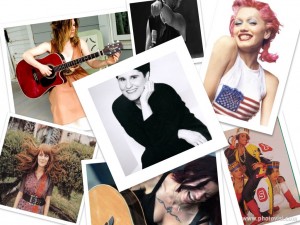 My first memory of Debbie Friedman’s music came from my mother. At the tender age of three, before bedtime I would listen to my mother sing “L’chi Lach.” I had no idea who Debbie Friedman was, but I already knew that her music was good for my soul…or at the very least, my sleeping patterns. When I first started thinking about writing this piece I wanted to explore the connection between feminism and music.
My first memory of Debbie Friedman’s music came from my mother. At the tender age of three, before bedtime I would listen to my mother sing “L’chi Lach.” I had no idea who Debbie Friedman was, but I already knew that her music was good for my soul…or at the very least, my sleeping patterns. When I first started thinking about writing this piece I wanted to explore the connection between feminism and music.
After Friedman’s tragic passing, it only seemed fitting to focus my thoughts largely on her.
As much as music in general, and Friedman’s in particular, played a part in my sleeping life, as I grew more cognizant of the world around me it began to hold equal weight in my waking life – specifically in my burgeoning feminism. As long as I can remember, my feminism has been connected to and encouraged by empowering, woman-centric music. Music is a powerful political and personal tool and therefore the perfect medium with which to make “the personal political.” Music evokes emotion, takes us back in time to a specific place or person and calls us to action.
Friedman’s music managed to call Jewish women to action; to remind us that we could and should take ownership over our religious identities. For years I didn’t even realize that “Miriam” and “Mi Shebeirach” were Debbie Friedman’s songs. I just thought that they were universally acknowledged, Jewish classics—which goes to show how much she was embraced by the larger community. The song “Miriam” stuck with me so firmly because it spoke explicitly about a woman and gave her a current importance that traditional Jewish History often does not. Although today the lyrics might not seem particularly revolutionary or subversive, they still give voice to Biblical women and by extension affirm the importance of women in the Jewish community today.
The earliest groundwork for my musical feminist awakening was surely laid by Debbie Friedman. As I grew up a little more and began attending a progressive, Jewish summer camp, I continued to embrace and be empowered by women musicians. Dar Williams is the most obvious example of this (and it is worth nothing that she and Friedman were both influenced by Joan Baez). Her words pushed listeners to question the rigidity of gender roles and religious affiliations, and pushed back at the consumerism that so often fuels these divisions. I remember being eleven or twelve, listening to “When I Was a Boy” and realizing what it meant to connect in a real way to lyrics:
And now I’m in this clothing store, and the signs say less is more
More that’s tight means more to see, more for them, not more for me
That can’t help me climb a tree in ten seconds flat
We live in a society where we are constantly bombarded with commercials urging us to buy this and that in order to be a real woman or real man. Songs that speak to this and other flawed realities, and make the listener feel angry enough to want to change them, are powerful tools. Luckily there are quite a number of rocking, lady-empowering artists out there whose songs do just that. In recognition of a few of them I have created a suggested listening playlist for this post.
1. Dar Williams, “As Cool As I Am”
2. No Doubt, “Just A Girl”
3. Alix Olson, “Eve’s Mouth”
4. Salt-N-Pepa, “None of Your Business”
5. Mirah, “Jerusalem”
6. Ani DiFranco, “Not A Pretty Girl”
7. Rilo Kiley, “It’s A Hit”
8. Jewel, “Who Will Save Your Soul”
My father, a childhood friend of Debbie Friedman’s, recently reflected upon her assertive nature and the way that she constantly encouraged her audiences to interact with her music. This interaction is exactly what makes “politically charged” music so moving. So readers, I encourage you to listen closely, get inspired and create some change; just the way Debbie surely would have liked it.
-Emma Gray
- 1 Comment
November 22, 2010 by Emma Gray
An Ode to the American Girl… Doll.
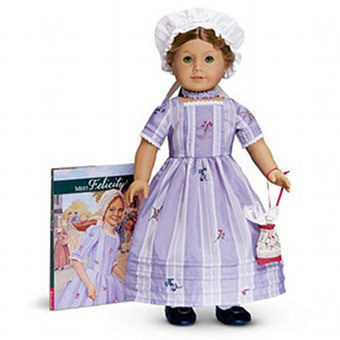 Recently, Jezebel alerted me to the fact that American Girl was retiring its Revolutionary War doll, Felicity Merriman. I got incredibly sad at the news, although my Felicity doll has long-been tucked away in the basement of my family’s house in Maryland. It also got me thinking about American Girl dolls, and their symbolic significance.
Recently, Jezebel alerted me to the fact that American Girl was retiring its Revolutionary War doll, Felicity Merriman. I got incredibly sad at the news, although my Felicity doll has long-been tucked away in the basement of my family’s house in Maryland. It also got me thinking about American Girl dolls, and their symbolic significance.
I recognize my own privilege in owning even one of these dolls. To buy one doll and one book costs nearly $100, which means that they are only available to a small sector of the population. The price factor alone greatly skews the company’s target audience and therefore determines what is produced.
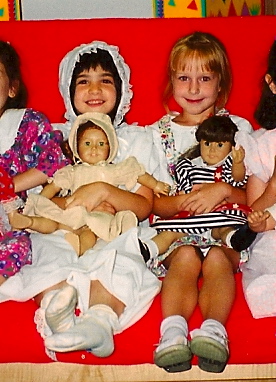 That being said, the dolls gave me a wonderfully empowering way to connect personally with US history. Their stories were fascinating and varied, and I read the books voraciously. From Swedish immigrant Kirsten and slave-girl Addy, to WWII-era Molly and suffragette Samantha, I connected to these girls and their narratives.
That being said, the dolls gave me a wonderfully empowering way to connect personally with US history. Their stories were fascinating and varied, and I read the books voraciously. From Swedish immigrant Kirsten and slave-girl Addy, to WWII-era Molly and suffragette Samantha, I connected to these girls and their narratives.
The experiences of women, and especially girls, are so often erased from our textbooks and collective historical memories. The American Girl dolls were one of my few reminders that women played immeasurable roles in the historical events that we cling to as a culture. Young women were immigrants, loyalists, revolutionaries, slaves and activists – even if they receive little recognition.
But when I worshiped these fictional ladies, every American Girl celebrated Christmas. In all of my empowered connectedness to these girls and their adventures, I always felt something lacking. Where was MY history?
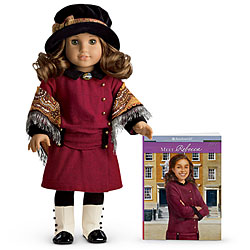 It was there partially, as I have always felt connected to my identity as an American. But my family’s trajectory was nowhere to be found in these girls’ stories. Each time the glossy catalogue was sent to our house, I doggedly perused it, secretly hoping that a Jewish doll would appear in its pages. As a child, it seemed so important that I find an AG story that validated my story. Rebecca Rubin now exists, but she did not become a reality until long after I lost interest in these American Girls.
It was there partially, as I have always felt connected to my identity as an American. But my family’s trajectory was nowhere to be found in these girls’ stories. Each time the glossy catalogue was sent to our house, I doggedly perused it, secretly hoping that a Jewish doll would appear in its pages. As a child, it seemed so important that I find an AG story that validated my story. Rebecca Rubin now exists, but she did not become a reality until long after I lost interest in these American Girls.
The truth is that every girl deserves to see representations of herself and her history. American Girl dolls have the potential to be amazing educational tools and empowering symbols for all young women, but there is still much progress to be made in the AG universe. First of all, keep pumping up the racial diversity! Secondly, knock down the price! It’s not as though upper middle-class girls have a premium on history (or HERstory).
–Emma Gray
- 1 Comment
November 4, 2010 by Emma Gray
The Glee is Mine
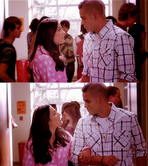 I am a 23-year-old aspiring writer and I moved to New York City just over a month ago. (I’m a newcomer to the Lilith blogosphere, and as someone who strongly identifies as a young Jewish feminist, it seems like a match made on JDate.) I’ll be exploring the way that pop culture intersects with and shapes identity – specifically my identity as a Jewish woman.
I am a 23-year-old aspiring writer and I moved to New York City just over a month ago. (I’m a newcomer to the Lilith blogosphere, and as someone who strongly identifies as a young Jewish feminist, it seems like a match made on JDate.) I’ll be exploring the way that pop culture intersects with and shapes identity – specifically my identity as a Jewish woman.
Glee is a TV show that has brought nothing but joy into my life. Not only has it produced a slammin’ cover version of “The Boy Is Mine,” (I’ll admit I’m a sucker for ’90s Brandy), but it also touches upon some potent issues. Musical theater and a progressive social message all in one? Pretty much a dream come true.
The most wonderful thing about Glee is how thought provoking it is. The most recent episodes have touched upon an array of issues, from male body image to the fluidity of sexuality. (Side Note: I’m completely obsessed with Brittany and Santana’s lady-loving.)
It has also been interesting to watch the way that the show deals with its Jewish characters. (more…)
- 2 Comments
 Please wait...
Please wait...